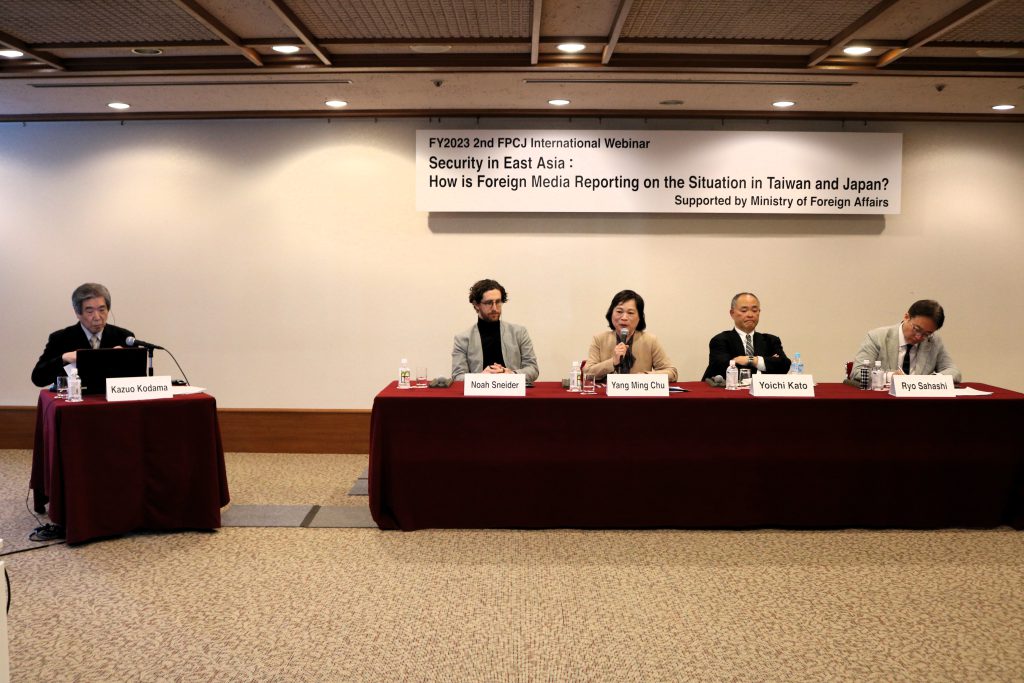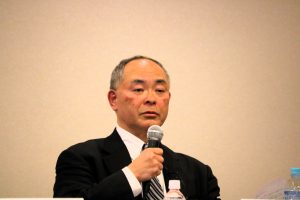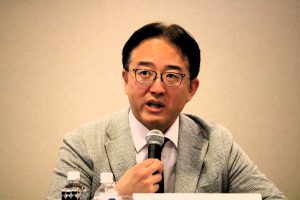Date : February 28, 2024
[Report] FY2023 2nd International FPCJ Webinar
post date : 2024.03.29
Security in East Asia: How Is Foreign Media Reporting on the Situation in Taiwan and Japan?
Supported by Ministry of Foreign Affairs

1. Webinar Goals and Participants
On January 13, 2024, Taiwan held a presidential election due to the end of President Tsai Ing-wen’s term. This election received attention from around the world due to the likelihood of the results having a major impact on the future of relations between Taiwan and mainland China, the reunification of Taiwan and China, and security in East Asia, including the security of Japan.
This webinar invited leading foreign journalists covering this issue in Tokyo and Taipei, as well as Japanese media experts, to look at how the international media is reporting on this issue, followed by a discussion about “What Should Concerned Parties (China, Taiwan, the US, Japan, etc.) Do to Avoid Armed Conflict in Taiwan.”
A total of 185 people registered to watch the webinar, and 98 joined to watch it live.
2. Program/Links to the Chapters of the Video Clip Above
|
Opening remarks |
|
|
Session 1 (initial statements, discussion) |
|
|
Session 2 (initial statements, discussion) |
|
|
Q&A |
|
|
Overall summary |
|
|
Closing remarks |
3. Introduction of Panelists
*For details on the webinar and its panelists, see here.
[Moderator] Kazuo Kodama, FPCJ President
[Panelists]
Foreign Media
- Yang Ming Chu, Tokyo Bureau Chief, Central News Agency (Taiwan)
- Noah Sneider, Tokyo Bureau Chief, The Economist (UK)
- Kathrin Hille, Greater China Correspondent, Financial Times (UK)
Experts (Japanese Media)
- Yoichi Kato, Special Fellow, Waseda University Institute of Asia-Pacific Studies
Academics
- Ryo Sahashi, Associate Professor of International Politics, Institute for Advanced Studies on Asia, The University of Tokyo
4. Session Summaries
Session 1: The Positions of Concerned Parties (China, Taiwan, the US, Japan, etc.) Regarding the Taiwan Issue, and Media Reporting on It
The webinar began with the moderator explaining the positions of the main concerned parties (China, Taiwan, the US, and Japan) regarding the Taiwan issue, including the historical background of those positions, followed by the panelists discussing the topic.
 Next, Ms. Yang Ming Chu explained the Taiwanese perception of China, the US, and Japan, stating that China’s election interference was considered as coming from a position of not understanding democracy, and the US was seeking to strengthen its relationship with Taiwan by supporting president-elect Lai Ching-te and having influential members of Congress visit Taiwan. She also noted that Japan was an important partner to Taiwan, and asked to send China messages not only about the economy and security, but about how the status quo of Taiwan must not be broken.
Next, Ms. Yang Ming Chu explained the Taiwanese perception of China, the US, and Japan, stating that China’s election interference was considered as coming from a position of not understanding democracy, and the US was seeking to strengthen its relationship with Taiwan by supporting president-elect Lai Ching-te and having influential members of Congress visit Taiwan. She also noted that Japan was an important partner to Taiwan, and asked to send China messages not only about the economy and security, but about how the status quo of Taiwan must not be broken.

Ms. Kathrin Hille explained that due to China, Taiwan, and the US having fluid relations while also affecting the situation in Taiwan, and all three having their own individual perspectives on the situation, it was difficult to report on Taiwan. She mentioned that while Taiwan was criticizing China for systemically applying pressure on Taiwan and raising tensions, China argued that the reason for growing tensions was due to Taiwan and the US trying to change the status quo of the Taiwan Strait, as well as criticizing the US for ignoring the One China policy and calling for the US to support peaceful reunification. Ms. Hille explained that US politicians’ approach to the relationship with China also affected the relationship with Taiwan, with some hawks using Taiwan as a way to provoke China. She further stated that it is difficult for journalists to report on
such a complicated situation, and that it was important to ensure that information was both reliable and unbiased.
 Mr. Noah Sneider noted that there was very little discussion regarding Taiwan in Japan five years ago, with mostly policymakers and analysts discussing the topic, but recently it was being discussed more openly as well as being covered by the media. He also explained that The Economist was working to increase readers’ understanding of China, and noted how objective, level-headed reporting was necessary when discussing the Taiwan issue. Mr. Sneider also commented on the importance of communicating changes in Japan’s role and policies to readers outside the region, and suggested discussions on Japan’s actions and policies should be carried out from a unique perspective not bound by its relationship with the US.
Mr. Noah Sneider noted that there was very little discussion regarding Taiwan in Japan five years ago, with mostly policymakers and analysts discussing the topic, but recently it was being discussed more openly as well as being covered by the media. He also explained that The Economist was working to increase readers’ understanding of China, and noted how objective, level-headed reporting was necessary when discussing the Taiwan issue. Mr. Sneider also commented on the importance of communicating changes in Japan’s role and policies to readers outside the region, and suggested discussions on Japan’s actions and policies should be carried out from a unique perspective not bound by its relationship with the US.
 Mr. Yoichi Kato first explained that the basic position of the Japanese government on relations with Taiwan was to “maintain working relations on a non-governmental basis.” He followed by noting how the joint statement released after the 2021 US-Japan summit was the first time emphasis was placed on the importance of “peace and stability across the Taiwan Strait.” This was well received by countries in Europe and elsewhere. In contrast, he stated that the Japanese government’s response was insufficient when China engaged in large-scale military exercises after the U.S. House Speaker Nancy Pelosi's visit to Taiwan in 2022, which was effectively a breakdown of “peace and stability.” He also commented on how although the Japanese government was maintaining a very cautious stance regarding measures for a crisis in Taiwan, Diet Members who are part of the ruling Liberal Democratic Party have made repeated comments from a position different from the government, such as “a crisis for Taiwan is a crisis for Japan.” Mr. Kato also explained that when looking at surveys in Taiwan, many respondents hoped that the Japan Self-Defense Forces would be sent to help them in the case of an armed conflict. However, considering current legal and policy frameworks, as well as the capabilities of the JDSF, this would definitely not happen, and so Japan’s actions at a governmental and civilian level were resulting in Taiwan having false hope.
Mr. Yoichi Kato first explained that the basic position of the Japanese government on relations with Taiwan was to “maintain working relations on a non-governmental basis.” He followed by noting how the joint statement released after the 2021 US-Japan summit was the first time emphasis was placed on the importance of “peace and stability across the Taiwan Strait.” This was well received by countries in Europe and elsewhere. In contrast, he stated that the Japanese government’s response was insufficient when China engaged in large-scale military exercises after the U.S. House Speaker Nancy Pelosi's visit to Taiwan in 2022, which was effectively a breakdown of “peace and stability.” He also commented on how although the Japanese government was maintaining a very cautious stance regarding measures for a crisis in Taiwan, Diet Members who are part of the ruling Liberal Democratic Party have made repeated comments from a position different from the government, such as “a crisis for Taiwan is a crisis for Japan.” Mr. Kato also explained that when looking at surveys in Taiwan, many respondents hoped that the Japan Self-Defense Forces would be sent to help them in the case of an armed conflict. However, considering current legal and policy frameworks, as well as the capabilities of the JDSF, this would definitely not happen, and so Japan’s actions at a governmental and civilian level were resulting in Taiwan having false hope.
 Dr. Ryo Sahashi stated that unbiased reporting on Taiwan was extremely important, and that reporting should include analysis diving into the joint lack of trust between the US, China, and Taiwan. He also argued that the biggest reason for the increased interest in Japan regarding an armed conflict in Taiwan was a statement made to the US Senate Committee on Armed Services in March 2021 by Admiral Davidson of the US Navy Indo-Pacific Command (regarding there being a possibility of China invading Taiwan within the next six years). He also argued for the necessity of Japanese media to report from a wider range of perspectives on the Taiwan issue, as most of the reporting stressed the imminence of a crisis in Taiwan while focusing on obvious aspects such as military scenarios, without touching on scenarios such as economic blockades or breaking off diplomatic relations.
Dr. Ryo Sahashi stated that unbiased reporting on Taiwan was extremely important, and that reporting should include analysis diving into the joint lack of trust between the US, China, and Taiwan. He also argued that the biggest reason for the increased interest in Japan regarding an armed conflict in Taiwan was a statement made to the US Senate Committee on Armed Services in March 2021 by Admiral Davidson of the US Navy Indo-Pacific Command (regarding there being a possibility of China invading Taiwan within the next six years). He also argued for the necessity of Japanese media to report from a wider range of perspectives on the Taiwan issue, as most of the reporting stressed the imminence of a crisis in Taiwan while focusing on obvious aspects such as military scenarios, without touching on scenarios such as economic blockades or breaking off diplomatic relations.
Session 2: What Should Concerned Parties (China, Taiwan, the US, Japan, etc.) Do to Avoid Armed Conflict in Taiwan
Ms. Yang commented that since Japan cut off diplomatic relations with the Republic of China in 1972, Japan’s position on Taiwan has remained vague, looking towards China while avoiding the topic of security. She also mentioned that while the Taiwan Relations Act which includes stipulations for security exists between the US and Taiwan, no such law exists between Japan and Taiwan, and it was necessary to quickly make a law to, among other things, provide a basis for how Japanese citizens in Taiwan would be evacuated in the case of an armed conflict in Taiwan.
Mr. Sneider mentioned that security dialogue and reassurance were necessary when discussing security. He further suggested that the media had a responsibility to report on reassuring aspects as well, and that it was important to focus not only on military aspects, but also diplomatic activities and economic and personal ties in the region as a whole. He also stated how deterrence was fundamentally a matter of perception and psychology, and that there was the possibility of a negative impact if Chinese leaders had the perception that the US was in chaos, weakening, and no longer able to fulfill its duties and responsibilities, and so it was important for the US to spend the energy and effort to heal domestic fractures as well, as that would have a major benefit not only for US society, but for deterrence in the Indo-Pacific region as well.
Mr. Kato explained that the original goal of the “strategic ambivalence” of the US was to prevent an invasion of Taiwan without the US showing all its cards to China, as well as preventing Taiwan from rushing heedlessly towards independence. He further stated that although it was significantly less meaningful in those respects now, it could still be effective in keeping China in check. He also argued that in order for Japan to prevent an armed conflict in Taiwan, the first step the country should take regarding military aspects was to strengthen the current policy framework for supporting the US when it took military action, including those based on Article VI of the Japan-U.S. Security Treaty. For non-military aspects, he argued that policies should be implemented to strengthen Taiwan, based on the concept that a resilient Taiwan benefits Japan. Specifically, he stated it was necessary to send the message that “Taiwan will not be abandoned” whenever possible in order to provide assurance to the people of Taiwan. He also called for supporting general improvements to Taiwan’s social and economic foundations, together with the US, to increase the resilience of Taiwanese society as a whole. Finally, he suggested Japan propose a new strategic framework for the region as a whole, including Taiwan.
Ms. Hille stated that in the short term, the US should avoid any provocative statements or actions that could increase tensions around Taiwan, and that the next president would have to be delicate regarding their policy on Taiwan. She followed by mentioning that Taiwanese president-elect Lai Ching-te had made some comments that could be considered provocative or risky by China, and so he needed a skilled advisor, while also suggesting China should engage in strategic patience. From a long term perspective, she noted the necessity of the US, Taiwan, and US allies to strengthen their deterrence capabilities, as well as the need for preparations for a sudden threat to be carried out with a more reliable method, and mentioned Taiwan would need to significantly improve its preparations to overcome its lack of deterrence capabilities.
Dr. Sahashi brought up two points for avoiding an armed conflict in Taiwan. First, he explained it was necessary for the US and China to ensure stability, engaging in dialogue with each other and avoiding sending the wrong signals, creating a framework for reassurance including not only deterrence, but also strategic ambiguity. He also stated that it was important for the US and China to engage in dialogue when the situation in Taiwan reached a crisis, and provided his analysis that China would likely seek conditions to coexist and avoid a war when tensions grew too high (a détente), and so how much reassurance to provide was important. He stated that how Japan, Taiwan, and other nations concerned about the stability of the Taiwan Straight should increase deterrence was an important point, and that it was necessary to think carefully on what could be done.
Q&A Session
Various questions were asked, such as about the gap between the perception of people in Japan and hopes in Taiwan and the US regarding Japan’s response in the case of an armed conflict in Taiwan, and what the media thought about how businesses and members of the foreign media occasionally refused to respond to questions that they perceived as being politically risky.
Overall Summary
The webinar finished with the panelists making the following comments:
Ms. Yang said that Japan was like family to Taiwan, and that while the people of Taiwan were very hopeful that Japan would help them in the case of an armed conflict in Taiwan, the reality was complex. She stated that if there was a way for Taiwan to contribute to Japan, she would like to help, and that she would like for Japan to continue to maintain a high level of interest in Taiwan.
Ms. Hille suggested it was necessary to report more on what the people of Taiwan think about the current situation, and on what people’s hopes and perspectives are. She mentioned that even though at the government level, there was increased understanding of the military movements of related countries, including Japan, but the perspectives at the level of the average citizen were more complex, and while many people hoping that Japan would help them in the case of an armed conflict could be considered as a positive view of Japan, it could also be considered as a lack of trust in the US.
Mr. Kato stated that Japan must take responsibility for its statement emphasizing the “peace and stability of the Taiwan Strait,” and together with the US consider how to deter actions seeking to destroy that peace and stability, and what response to make should it be destroyed, making preparations to those ends. He also argued for Japan to seriously consider what negative impacts there would be on Japan in the event that China succeeded in reunification with Taiwan, and stressed the necessity of policies to support Taiwan that were in Japan’s national interest.
Mr. Sneider suggested that there were a variety of complicated perspectives to consider in order to avoid an armed conflict in Taiwan. He mentioned the roles of the Philippines and Ryukyu and Okinawa in Japan, noting that even within Japan there were many differences of opinion and nuance, and ended by stating his intention to keep this wealth of perspectives in mind and reflect it in his reporting.
Dr. Sahashi stated that in the case that former President Trump won this year’s US presidential election, there was a possibility of two extremes in the US approach to Taiwan, either a hardline approach towards China or an America First policy, and it was necessary to keep this in mind while simulating a variety of possibilities. He also argued it was necessary for Japan to carry out a variety of debates regarding Taiwan, and that it was important to improve the framework for reporting on Taiwan.
To conclude, the moderator, FPCJ President Kazuo Kodama, provided the following summary:
(1) The most important factor in avoiding an armed conflict in Taiwan was deterrence and dialogue between the US and China, with both countries maintaining a stable relationship.
(2) Japan’s role was not only to ensure its own deterrence capabilities, but also to correctly understand the intentions of the US, China, and Taiwan, and that it was important to provide assurances and diplomatic support to Taiwan in order to avoid misunderstandings.
(3) The importance of Taiwan engaging in democracy should be considered paramount, and Japan should increase relations at a working level not involving governments, in order to support Taiwan’s resilience.
(4) The media should take care not to spread any statements which distort the truth and could increase mistrust between the US and China, and to avoid inflaming tensions unnecessarily.



